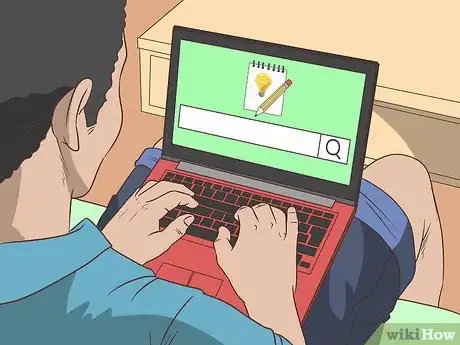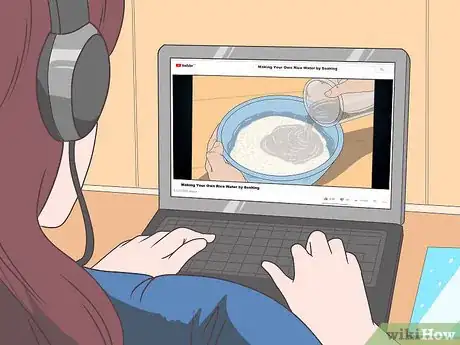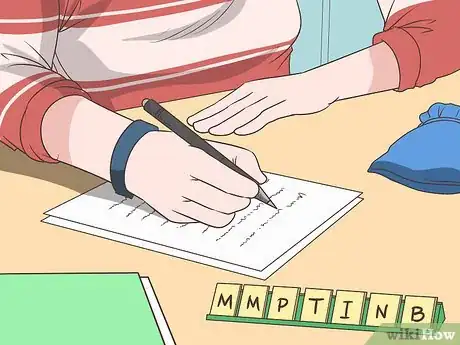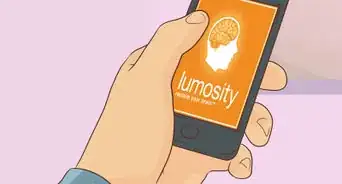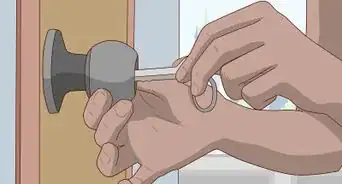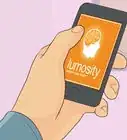This article was co-authored by Jai Flicker. Jai Flicker is an Academic Tutor and the CEO and Founder of Lifeworks Learning Center, a San Francisco Bay Area-based business focused on providing tutoring, parental support, test preparation, college essay writing help, and psychoeducational evaluations to help students transform their attitude toward learning. Jai has over 20 years of experience in the education management industry. He holds a BA in Philosophy from the University of California, San Diego.
There are 9 references cited in this article, which can be found at the bottom of the page.
wikiHow marks an article as reader-approved once it receives enough positive feedback. In this case, 95% of readers who voted found the article helpful, earning it our reader-approved status.
This article has been viewed 229,902 times.
There’s no way to know everything, but it’s a great idea to try to learn something new every day. Start by looking for ways to find new information each day. Books and the internet are your friends! You can also pick a new skill to learn that you can practice daily. It’s also important to keep your mind open. You never know when an opportunity to learn will pop up!
Steps
Seeking Out New Information
-
1Follow the news to keep up with current events. You can learn something every day by paying attention to the news. You can watch news on TV or listen to the radio. You can also read traditional newspapers or follow online news sites.[1]
- Try to follow both local and international news each day. For example, read an article in your local paper and then check out the BBC.
Tip: Get your information from a variety of sources. Many news outlets skew left or right, so getting more than one perspective is a great way to learn balanced information.
-
2Read books and articles to expand your awareness. Reading is one of the most effective ways to learn. Make a point to read every day. It can be for an hour before bed, or just for 10 minutes on your lunch break. Both fiction and non-fiction are great choices![2]
- Choose fiction to discover new places through a character’s experience. You can also gain insight on emotions and interpersonal relationships. For instance, you might try reading The Kite Runner by Khaled Hosseini to learn about life in Afghanistan.
- Non-fiction can teach you about anything, from history to how to build a car. If you'd like to learn more about American political history, try Truman by David McCullough.
- Try listening to an audiobook while you cook dinner or on your daily commute.
- Go slow and really think about what you're reading, which will help you get the most out of it.[3]
Advertisement -
3Explore the Internet to discover new things. The internet has an endless supply of information and there is more added everyday! You can use a popular search engine to search for a specific topic. For example, you might type in “healthcare in the UK.”[4]
- You can also just randomly explore. Go to any popular website and just keep following links that interest you.
- Keep in mind that just because something is on the internet doesn’t make it true. You still need to verify the source before accepting something as fact. If something doesn't ring true, look for another source to check the information. Try to avoid sites that seem focused on presenting a certain agenda, rather than just the facts.
- Sources such as government agencies, universities, and hospitals typically offer the most factual, up to date information.
-
4Take a class to keep your mind engaged. If you’re already a student, you’re all set! But don’t worry, even if you’re done with your formal education you can continue to take classes. There are many options out there for you.[5]
- For a traditional course, contact your local university or community college. You can often take single classes for continuing education.
- There are also online classes you can take, through traditional colleges or other websites.
- Take a class in whatever interests you! It can be anything from psychology to art.
-
5Watch online videos to see how things are done. In addition to reading on the internet, you can learn a lot by watching videos. If you’re a visual learner, videos can be a really useful tool for you. Simply search for something like “sew curtains video” and have fun exploring the results.[6]
- You can also browse popular video sites like YouTube and click on whatever interests you.
-
6Ask questions to gather additional information. This is one of the simplest ways to learn something new. Make it a point each day to ask someone a question. No matter what you ask, you’re guaranteed to learn something![7]
- Ask your boss, “Do you have feedback for me on my last project? I wanted to know if it made an impact on sales.”
- Or you could ask a friend, “I know you’re from Oklahoma. I’ve never been there, can you tell me what it is like?”
Learning New Skills
-
1Study a new language that interests you. Learning a new language is a great way to expand your knowledge. You’ll need to go over your vocabulary and grammar daily, so this will help you achieve your goal of learning something new every day. You can take a class at a community college, with a private tutor, or use online software.[8]
Tip: Choose a language that will benefit you in some way. If your company has a branch in Japan, you might consider learning Japanese. If you’d love to travel to Italy, learn some basic Italian.
-
2Start a garden if you like the outdoors. Taking care of plants is a useful way to learn a new skill. You’ll need to learn how to select plants for your climate, figure out how to plant them, and how to care for them. You can find tips online, at your local gardening center, or by joining a local gardening club.[9]
- Planting a flower garden is a great way to beautify your yard. You could also choose to plant veggies to feed friends and family.
-
3Improve your cooking skills for a useful hobby. Cooking is a skill that you can work on and learn about each day. If you’re a beginner, start slow. You might start by learning how to make scrambled eggs or an easy pasta dish. When you begin to get the hang of it, you can challenge yourself by trying new techniques and recipes.[10]
- You can learn about cooking by following food bloggers, watching cooking shows, reading cookbooks, and watching instructional videos.
- Mix things up and take a cooking class to learn a new type of dish!
-
4Play a musical instrument if you love music. Learning to play a musical instrument requires daily practice. Each day, you can challenge yourself by learning new notes, new scales, or even a whole new song. Pick an instrument that you can access easily. [11]
- For example, don’t choose to learn the piano if you don’t have easy access to one. Try the guitar instead.
- Choose to play a type of music that you like so that you will stay engaged. If rock music is your favorite, learn to play that!
-
5Try dancing for a fun activity. Dancing is another skill that takes a lot of hard work. Try taking dance classes at a nearby community center or dance school. You can practice your steps at home and continually learn new routines.[12]
- You can also watch dance tutorials online to learn to develop new skills.
Being Receptive to Learning
-
1Observe your surroundings to notice new things. Learning something new can be as simple as just paying closer attention to the things around you. For example, the next time you go to get your morning coffee, notice how the barista prepares your order. You might find yourself thinking, “Oh, that’s what a pour over is! I learned something new!”
-
2Meet new people to expand your network. Interacting with people is one of the best ways to learn! Make it a point to get to know new people on a regular basis. You can ask them about their experiences and preferences, learning a lot in the process.[13]
Tip: Look for ways to get to know people from different backgrounds so that you can learn about something you didn’t know before. For example, you could ask your neighbor from Poland what types of foods are popular in their home country.
-
3Be open to new experiences. Actually doing things is a great way to learn something new. Be ready to try new things. Work on saying “yes” to things. For example, if a friend asks you to go kayaking you can say, “I’ve never done that, but I’d love to learn!”
-
4Keep your memory strong. You want to be able to retain what you learn, so work on keeping your memory fresh. Physical health is important for this, so eat a balanced diet and get regular exercise. You can also boost your brain health by doing crossword puzzles and playing other types of word games.[14]
-
5Apply your knowledge to your daily life. There are a lot of ways that you can integrate the things you learn into your routine. When you learn something that would be interesting to you, take note. Then think about how you can use the information to your advantage.
- For example, if you recently read that berries are good for brain health, add some to your grocery list. You can start adding some blueberries to your breakfast each day.
Expert Q&A
Did you know you can get expert answers for this article?
Unlock expert answers by supporting wikiHow
-
QuestionWhat's the best way to learn something new every day?
 Jai FlickerJai Flicker is an Academic Tutor and the CEO and Founder of Lifeworks Learning Center, a San Francisco Bay Area-based business focused on providing tutoring, parental support, test preparation, college essay writing help, and psychoeducational evaluations to help students transform their attitude toward learning. Jai has over 20 years of experience in the education management industry. He holds a BA in Philosophy from the University of California, San Diego.
Jai FlickerJai Flicker is an Academic Tutor and the CEO and Founder of Lifeworks Learning Center, a San Francisco Bay Area-based business focused on providing tutoring, parental support, test preparation, college essay writing help, and psychoeducational evaluations to help students transform their attitude toward learning. Jai has over 20 years of experience in the education management industry. He holds a BA in Philosophy from the University of California, San Diego.
Academic Tutor
References
- ↑ https://www.themuse.com/advice/staying-current-get-global-news-the-right-way
- ↑ https://writingcooperative.com/the-benefits-of-reading-everyday-why-im-reading-100-books-this-year-f9c292350222
- ↑ Jai Flicker. Academic Tutor. Expert Interview. 20 May 2020.
- ↑ https://www.cnbc.com/2018/01/04/online-tools-bill-gates-uses-to-learn-something-new-every-day.html
- ↑ https://www.cnbc.com/2018/01/04/online-tools-bill-gates-uses-to-learn-something-new-every-day.html
- ↑ https://www.cnbc.com/2018/01/04/online-tools-bill-gates-uses-to-learn-something-new-every-day.html
- ↑ https://hbr.org/2010/02/learn-to-ask-better-questions
- ↑ https://www.globalcitizen.org/en/content/7-benefits-of-learning-another-language/
- ↑ https://www.developgoodhabits.com/new-skills-to-learn/
- ↑ https://www.developgoodhabits.com/new-skills-to-learn/
- ↑ https://www.developgoodhabits.com/new-skills-to-learn/
- ↑ https://www.developgoodhabits.com/new-skills-to-learn/
- ↑ https://www.mayoclinic.org/healthy-lifestyle/adult-health/in-depth/friendships/art-20044860
- ↑ https://www.helpguide.org/articles/healthy-living/how-to-improve-your-memory.htm
About This Article
If you want to learn something new every day, follow the news to keep up with current events. You can watch news on TV, listen to it on the radio, or read it in the newspaper or online. When you hear about something that catches your interest, learn more about it by reading books and article on the subject. You can also take classes, watch online videos, or ask questions to find out more about something you’re interested in. For tips on learning a new skill, keep reading!



